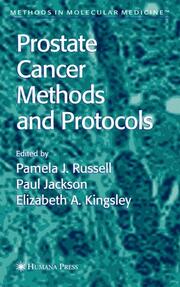Detailansicht
Prostate Cancer Methods and Protocols
Methods in Molecular Medicine 81
ISBN/EAN: 9780896039780
Umbreit-Nr.: 1425729
Sprache:
Englisch
Umfang: xii, 403 S.
Format in cm:
Einband:
gebundenes Buch
Erschienen am 17.04.2003
- Zusatztext
- InhaltsangabeEpidemiological Investigation of Prostate Cancer Graham G. Giles Human Prostate Cancer Cell Lines Pamela J. Russell and Elizabeth A. Kingsley Growth of Prostatic Epithelial and Stromal Cells In Vitro Donna M. Peehl Prostate Epithelial Stem Cell Isolation and Culture David L. Hudson and John R. W. Masters Generation of Immortal Human Prostate Cell Lines for the Study of Prostate Cancer Johng S. Rhim Spheroids of Prostate Tumor Cell Lines George Sgouros, Wei-Hong Yang, and Richard Enmon Animal Models of Prostate Cancer Pamela J. Russell and Dale J. Voeks Transgenic Mouse Models for Prostate Cancer: Identification of an Androgen-Dependent Promoter and Creation and Characterization of the Long Probasin Promoter-Large T Antigen (LPB-Tag) Model Susan Kasper, William Tu, Richard L. Roberts, and Scott B. Shappell In Vivo Models of Human Prostate Cancer Bone Metastasis Julie M. Brown Effects of Fixation on Tissues Elin Mortensen and Julie M. Brown Background, Methods, and Protocols for the Histopathological Diagnosis of Prostate Carcinoma Warick Delprado Realizing the Potential of Ejaculate/Seminal Fluid in Detecting and Predicting Natural History R. A. Gardiner, Michelle Burger, Judith A. Clements, and Martin F. Lavin Bisulfite Methylation Analysis of Tumor Suppressor Genes in Prostate Cancer from Fresh and Archival Tissue Samples Susan J. Clark, Douglas S. Millar, and Peter Molloy Production and Characterization of Antipeptide Kallikrein 4 Antibodies: Use of Computer Modeling to Design Peptides Specific to Kallikrein 4 Tracey J. Harvey, Ying Dong, Loan Bui, Russell Jarrott, Terry Walsh, and Judith A. Clements The Androgen Receptor CAG Repeat and Prostate Cancer Risk Peter E. Clark, Ryan A. Irvine, and Gerhard A. Coetzee Studies on Androgen Receptor Mutations and Amplification in Human Prostate Cancer Zoran Culig, Alfred Hobisch, Martin Erdel, Georg Bartsch, and Helmut Klocker Proteomics in the Analysis of Prostate Cancer Soren NaabyHansen, Kohji Nagano, Piers Gaffney, John R. W. Masters, and Rainer Cramer Application of Gene Microarrays in the Study of Prostate Cancer Colleen C. Nelson, Douglas Hoffart, Martin E. Gleave, and Paul S. Rennie Enhancer Trap Method Using a Green Fluorescent Protein Reporter Plasmid for Cloning Tissue-Specific Enhancers Active in Prostate Cells Fujiko Watt and Peter Molloy Targeted Alpha Therapy of Prostate Cancer Barry J. Allen, Yong Li, Syed M. A. Rizvi, and Pamela J. Russell Phenotypic and Functional Differences of Dendritic Cells Generated Under Different In Vitro Conditions Stephanie E. B. McArdle, Selman A. Ali, Geng Li, Shahid Mian, and Robert C. Rees Flavonoid Compounds in the Prevention and Treatment of Prostate Cancer Graham E. Kelly and Alan J. Husband Index
- Kurztext
- With the prostate as the second leading site of cancer among males in Western society, the need to know why certain prostate cancers remain localized while others become aggressive and metastasize has become critical for the care of patients. In Prostate Cancer Methods and Protocols, leading investigators present basic and advanced molecular methods that reveal those markers essential for more accurate diagnoses of specific diseases, and in developing new treatment strategies. The techniques range from in vitro methods to in vivo models of prostate cancer. New methods for the accurate diagnosis of prostate cancer are also offered, including histological assessment, studies of cells in semen, and methylation analysis of the GSTpi, a potential prostate cancer-specific marker. Additional approaches, including proteome and microarray analyses, address such issues as assessing changes in the androgen receptor and studying the enzymes secreted by prostate cancer cells. New strategies for the treatment of refractory disease cover the role of flavonoids, targeted alpha therapy, methods for implementing immune therapy, and prostate-specific gene therapy. Each method is described in step-by-step detail to ensure successful results. Comprehensive and cutting-edge, Prostate Cancer Methods and Protocols provides access to the many powerful tools needed by scientists engaged in prostate cancer research today, as well as up-to-date reviews on several key aspects of the disease.
